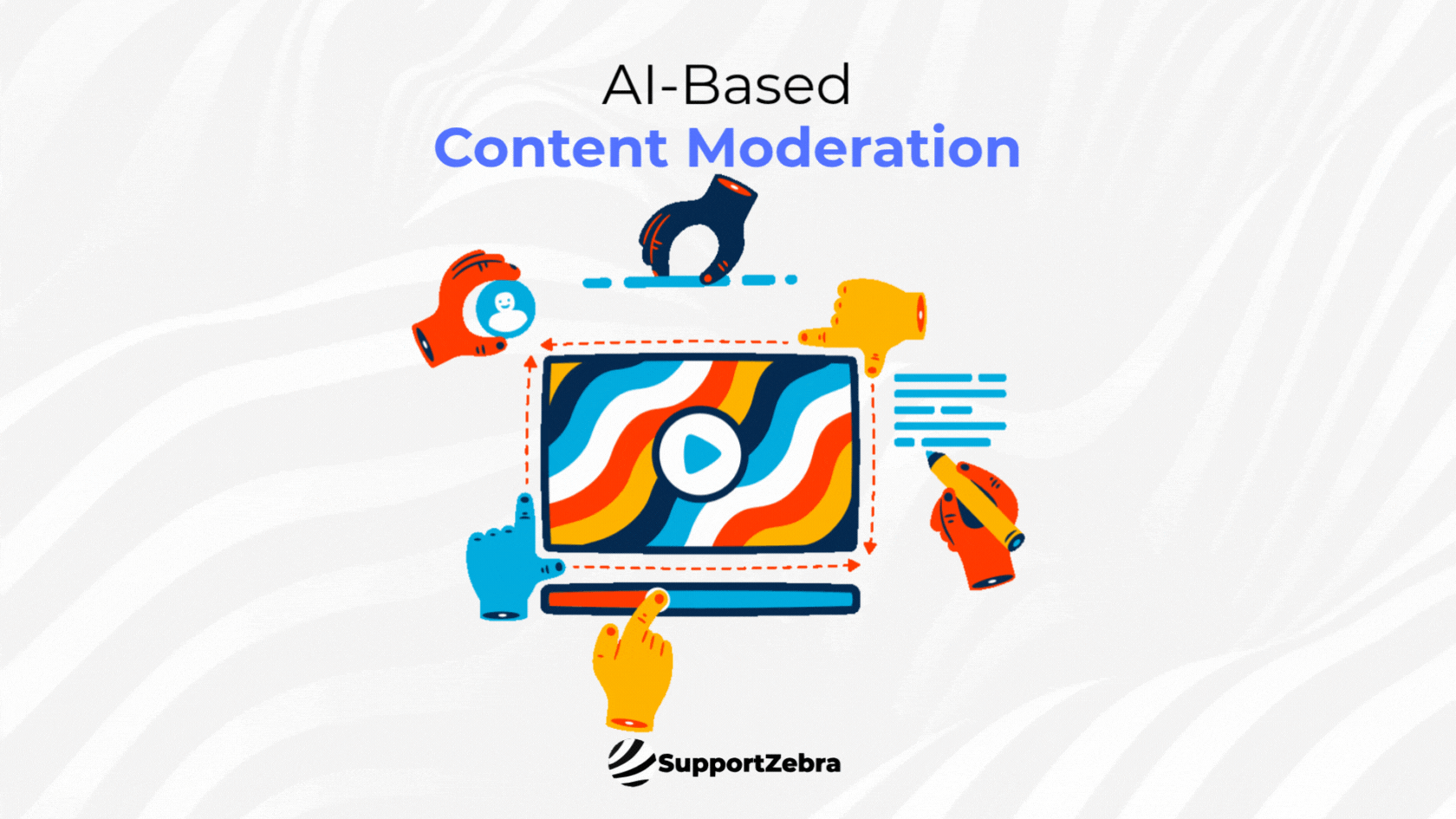Understanding AI-Based Content Moderation for Digital Platforms
Managing harmful or inappropriate content online can feel like an overwhelming, never-ending battle—especially when your team is stretched thin and bad actors always seem one step ahead. Without a smarter, scalable solution, your platform risks damaging its reputation, losing user trust, and even facing legal consequences.
That’s where AI-based content moderation steps in—offering real-time, reliable protection to keep your digital spaces safe and compliant.
What Is AI-Based Content Moderation?
AI-based content moderation refers to the use of artificial intelligence technologies, such as machine learning (ML), natural language processing (NLP), and computer vision, to automatically analyze, filter, and manage user-generated content on digital platforms. The primary goal is to ensure that online communities remain safe, welcoming, and compliant with legal and platform-specific guidelines by detecting and handling inappropriate, harmful, or illegal material before it reaches or impacts users.
How Does AI Content Moderation Work?
AI content moderation operates through a multi-step process:
- Data Collection: The system gathers user-generated content, including text, images, audio, and video, from the platform.
- Analysis: Using NLP and ML, the AI analyzes the content for context, sentiment, and potential violations, such as hate speech, explicit material, spam, or scams.
- Decision Making: The AI applies predefined rules and learned patterns to decide whether to approve, flag, or reject the content.
- Human Review: For ambiguous or complex cases, flagged content is escalated to human moderators, who provide context-sensitive judgment and feedback, helping the AI improve over time.
This approach enables rapid, large-scale moderation while still incorporating human oversight, where nuance and context are essential.
What Are the Main Types of AI Content Moderation?
There are several core types of AI content moderation, each with its own strengths and use cases:
- Pre-Moderation: Content is analyzed and approved or rejected by AI before it is published. This prevents harmful content from reaching users but may introduce delays, making it less suitable for real-time platforms.
- Post-Moderation: Content is published immediately and reviewed by AI (and sometimes humans) afterward. Harmful material might be visible temporarily, but this approach supports real-time interactions.
- Reactive Moderation: Moderation occurs in response to user reports. The system relies on community feedback to flag inappropriate content, which both AI and human moderators then review.
- Proactive Moderation: AI continuously scans published content to detect and remove harmful material before users report it, enhancing real-time safety.
- Hybrid Moderation: Combines AI automation with human oversight. AI handles high-volume, straightforward cases, while humans address nuanced or borderline content. This balances speed, scalability, and contextual understanding.
What Technologies Power AI Content Moderation?
AI content moderation leverages several advanced technologies:
- Natural Language Processing (NLP): Enables the system to understand and interpret text, including context, sentiment, and intent.
- Computer Vision: Allows analysis of images and videos to detect explicit, violent, or otherwise inappropriate visual content.
- Machine Learning Algorithms: Learn from vast datasets to recognize patterns associated with harmful or prohibited content.
- Automation Tools: Integrate these technologies into workflows that can operate at the scale and speed required by modern digital platforms.
What Are the Benefits of AI-Based Content Moderation?
AI-based content moderation offers a range of advantages:
- Efficiency and Speed: AI can process vast amounts of content in real time, flagging or removing inappropriate material almost instantly.
- Cost-Effectiveness: Reduces the need for large teams of human moderators, cutting labor costs and allowing 24/7 operation without fatigue.
- Consistency: Ensures uniform application of moderation rules, minimizing subjective human inconsistencies and building user trust.
- Scalability: Effortlessly handles spikes in user activity or content volume, supporting platform growth without compromising performance.
- Enhanced Security: Detects scams, phishing, and malware, protecting users and platforms from digital threats.
- Emotional Well-being: Shields human moderators from exposure to disturbing or traumatic content by automatically handling the most egregious material.
What Are the Challenges and Limitations of AI Content Moderation?
Despite its strengths, AI moderation faces significant challenges:
- Context and Nuance: AI often struggles to comprehend sarcasm, irony, satire, or cultural references, resulting in false positives (where innocent content is flagged) and false negatives (where harmful content is missed).
- Bias: Algorithms trained on biased datasets may disproportionately target specific groups or overlook context-specific issues, reinforcing societal biases.
- Evolving Language: Slang, coded language, and rapidly changing trends can outpace AI’s ability to detect new forms of harmful content.
- Transparency and Accountability: Automated decisions can be opaque, making it difficult for users to understand why content was removed or flagged.
- Over-Reliance on Automation: Excessive automation can amplify mistakes, as machines lack the nuanced judgment required for complex cases.
How Can Platforms Address the Ethical and Practical Issues of AI Moderation?
To mitigate these challenges, platforms are adopting several best practices:
- Human-in-the-Loop: Combining AI with human oversight ensures nuanced, context-aware decisions and continuous system improvement.
- Algorithm Refinement: Regularly updating and retraining AI models with diverse, representative datasets helps reduce bias and improve accuracy.
- Transparency: Providing clear explanations for moderation decisions helps build user trust and allows for appeals or corrections.
- Customization: Tailoring AI moderation systems to platform-specific needs, languages, and cultural contexts enhances effectiveness and fairness.
What Is the Future of AI Content Moderation?
AI-based content moderation is poised to become even more central as digital platforms continue to grow. The future will likely see:
- Greater Automation: Most moderation decisions are already made by machines, and this trend is accelerating.
- Improved Contextual Understanding: Advances in AI, including large language models and multimodal analysis, promise more effective handling of nuance and context.
- Enhanced Collaboration: The ongoing integration of human expertise, civil society input, and regulatory oversight will help ensure that moderation systems are ethical, practical, and aligned with human rights.
- Continuous Adaptation: As online behaviors and threats evolve, AI moderation systems must adapt rapidly to maintain safe and inclusive digital environments.
AI-based content moderation is revolutionizing how platforms manage user-generated content, providing powerful tools for enhanced safety, scalability, and efficiency. While challenges remain, a balanced approach—combining automation with human judgment and ethical oversight—will be key to building trustworthy and resilient online communities.
Don’t Let Harmful Content Slip Through—Automate Your Moderation Now.

AI-based content moderation is no longer a luxury—it’s a necessity for businesses looking to scale safely, protect their brand, and maintain user trust in a fast-moving digital world. While the technology offers speed, consistency, and efficiency, it works best when paired with human insight and ethical oversight.
That’s where SupportZebra comes in. Our hybrid moderation solutions combine advanced AI tools with skilled human reviewers to deliver accurate, culturally aware, and scalable moderation support. Whether you’re managing user-generated content, reviews, or social interactions, we help you stay compliant, protect your community, and focus on growth, not content fires.
Get in touch with SupportZebra today to learn how we can tailor an AI-powered moderation solution for your business.

